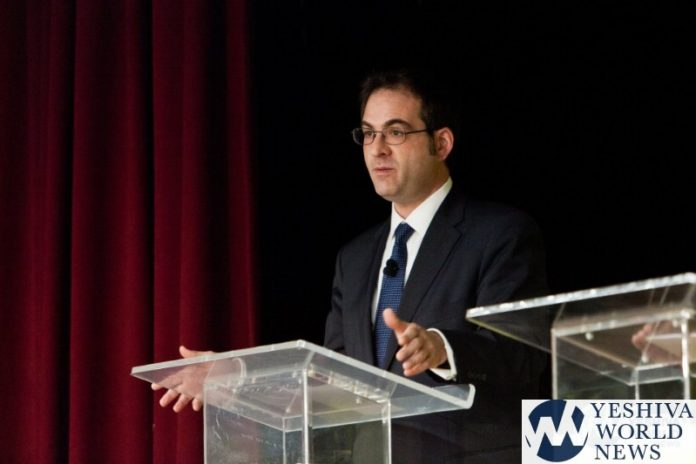The City of New York announced a $500 million lawsuit Tuesday against more than a dozen pharmaceutical companies involved in the production and distribution of opioids, alleging that taxpayers have been forced to bear a substantial burden of the opioid crisis due to increased health and law enforcement spending.
City Councilman Kalman Yeger saluted the City’s lawsuit. “The opioid epidemic has plagued our communities, our families and our city for too long,” Yeger said. “We will hold accountable those who put profit over people’s lives.”
Mayor Bill de Blasio, at a press conference Tuesday, said that more than three New Yorkers die every day due to opiates and opioids. He linked those deaths to the oversupply of opioids and the deceptive marketing of pharmaceutical companies, including the makers of Percocet and OxyContin, both of which are defendants in the lawsuit.
“I’m grateful that Mayor de Blasio is taking this vital step, and I’m proud to support his efforts. In addition, I pledge to use my own office in every way I can to combat this crisis,” Yeger said.
Yeger is committed to continuing his predecessor’s support of organizations focused on helping families facing the plague of the opioid crisis. “Councilman David Greenfield was our foremost advocate on this important issue, and I plan to continue his work,” Yeger said.
With 2.7 million opioid prescriptions filed by New York City doctors in just the three year period from 2014 to 2016, the opioid crisis has affected every neighborhood in the five boroughs, including Midwood and Boro Park. Last summer, the fatal overdose of a 20-year-old Boro Park resident focused the community’s attention on the crisis.
Among the many policy steps taken by City officials to curb the alarming rise in overdoses is distributing 60,000 doses of Naloxone, which cost taxpayers $38 million. Overdose rates doubled in New York City between 2010 and 2016.
“These defendants make millions upon millions from opioid prescriptions, and New York taxpayers are footing the bill. Even worse than the heavy financial toll, we’re losing our friends and neighbors to this epidemic. This needs to stop now, and the Mayor’s lawsuit is the first step,” Yeger said.
(YWN World Headquarters – NYC)












One Response
No clue whether this lawsuit has merit or will achieve any success. But a more professional examination of the problem suggests that this is very close to useless if one hopes to bring about a drug free population as a result. No, it’s not as simple as “People kill people, guns don’t kill people”.
Firstly, the role of treatment of addiction is critical in reducing the incidence. Why? Because inadequate treatment leads to recidivism and relapse. That field today is hampered by a severe lack of access to services, with health insurance casting off most of its responsibility. The most intensive levels of treatment, so often needed, are denied by insurance. Often the insurance companies demand failure at lower levels of treatment before considering more intensive. This is dreadful, as there is substantial basis to make recommendations for the more intensive levels, supported by research and experience. This exposes the needier addicts to the risk of overdose because of denied treatment. It also puts many rehabs out of business, and the choices for treatment are more limited.
Second, the legal system fought the more stringent laws regarding drug dealing and distribution. We watched Obama pardon and commute sentences of major drug dealers, just because of their race. They returned to their only parnosoh, and the risk to the population goes up again.
Thirdly, more specific to the Jewish community, we are seriously lacking in treatment facilities that are sensitive to our needs. There have been several programs developed over the past many years. Besides a few that still exist, most became extinct. This is a complex issue, and there are many reasons for these failures. None of these include a shortage of addicts who need help.
Finally, the availability of these opioids to the drug addict consumer most often begins with a prescribing physician. These professionals are rarely prosecuted, stripped of their licenses, and jailed. There are such doctors everywhere. Their prescribing practices need to be under surveillance, and should be audited and prosecuted if they become white-coated drug dealers.
How much will a lawsuit accomplish? I doubt much. It has zero bearing on the other abused drugs, including the tranquilizers, sleeping pills, non-opioid pills, and the gamut of street drugs such as heroin, ecstasy, and cocaine.
If there is true interest in tackling the problem, the focus must be wider.